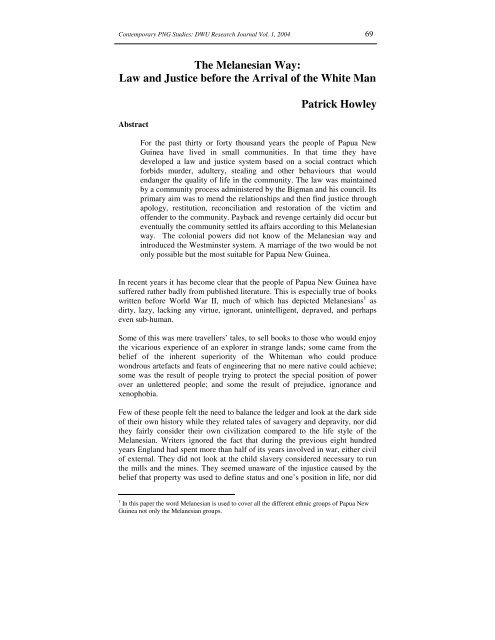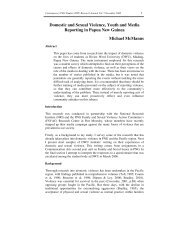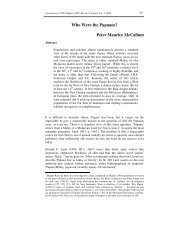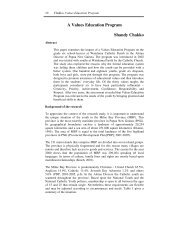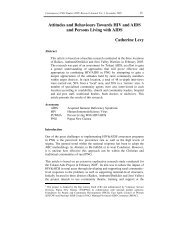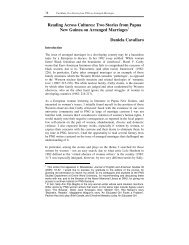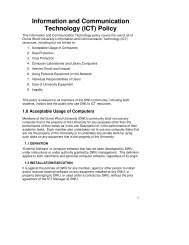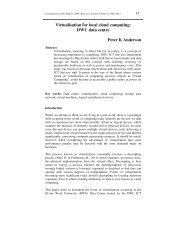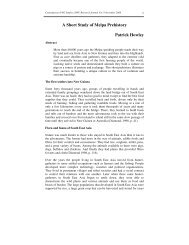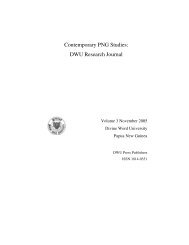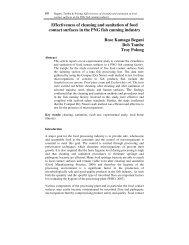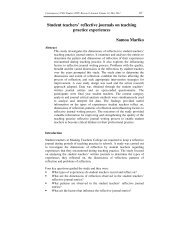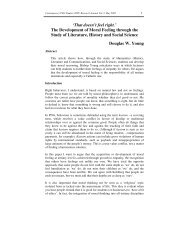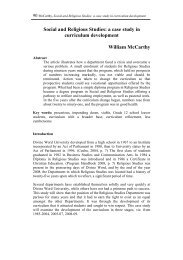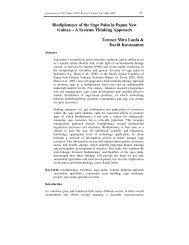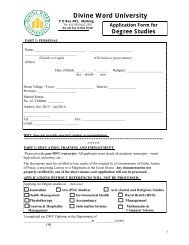The Melanesian Way - Divine Word University
The Melanesian Way - Divine Word University
The Melanesian Way - Divine Word University
You also want an ePaper? Increase the reach of your titles
YUMPU automatically turns print PDFs into web optimized ePapers that Google loves.
Contemporary PNG Studies: DWU Research Journal Vol. 1, 2004 69<br />
<strong>The</strong> <strong>Melanesian</strong> <strong>Way</strong>:<br />
Law and Justice before the Arrival of the White Man<br />
Abstract<br />
Patrick Howley<br />
For the past thirty or forty thousand years the people of Papua New<br />
Guinea have lived in small communities. In that time they have<br />
developed a law and justice system based on a social contract which<br />
forbids murder, adultery, stealing and other behaviours that would<br />
endanger the quality of life in the community. <strong>The</strong> law was maintained<br />
by a community process administered by the Bigman and his council. Its<br />
primary aim was to mend the relationships and then find justice through<br />
apology, restitution, reconciliation and restoration of the victim and<br />
offender to the community. Payback and revenge certainly did occur but<br />
eventually the community settled its affairs according to this <strong>Melanesian</strong><br />
way. <strong>The</strong> colonial powers did not know of the <strong>Melanesian</strong> way and<br />
introduced the Westminster system. A marriage of the two would be not<br />
only possible but the most suitable for Papua New Guinea.<br />
In recent years it has become clear that the people of Papua New Guinea have<br />
suffered rather badly from published literature. This is especially true of books<br />
written before World War II, much of which has depicted <strong>Melanesian</strong>s 1 as<br />
dirty, lazy, lacking any virtue, ignorant, unintelligent, depraved, and perhaps<br />
even sub-human.<br />
Some of this was mere travellers’ tales, to sell books to those who would enjoy<br />
the vicarious experience of an explorer in strange lands; some came from the<br />
belief of the inherent superiority of the Whiteman who could produce<br />
wondrous artefacts and feats of engineering that no mere native could achieve;<br />
some was the result of people trying to protect the special position of power<br />
over an unlettered people; and some the result of prejudice, ignorance and<br />
xenophobia.<br />
Few of these people felt the need to balance the ledger and look at the dark side<br />
of their own history while they related tales of savagery and depravity, nor did<br />
they fairly consider their own civilization compared to the life style of the<br />
<strong>Melanesian</strong>. Writers ignored the fact that during the previous eight hundred<br />
years England had spent more than half of its years involved in war, either civil<br />
of external. <strong>The</strong>y did not look at the child slavery considered necessary to run<br />
the mills and the mines. <strong>The</strong>y seemed unaware of the injustice caused by the<br />
belief that property was used to define status and one’s position in life, nor did<br />
1 In this paper the word <strong>Melanesian</strong> is used to cover all the different ethnic groups of Papua New<br />
Guinea not only the <strong>Melanesian</strong> groups.
70 Howley, <strong>Melanesian</strong> <strong>Way</strong> of Law and Justice<br />
they question the God-given-right of the nobility to protect their property rights<br />
and enjoy an extraordinary class distinction. <strong>The</strong>y seemed unaware of the legal<br />
system, which had used, as a matter of course, the most dreadful tortures to<br />
gain confession and send victims to execution in a most cruel and barbarous<br />
manner. <strong>The</strong>re was no reference to the horrors of the jails where men, women,<br />
murderers, common criminals, petty thieves and the insane were all herded in<br />
together with little supervision, nor to the fact that when the jails and the old<br />
un-seaworthy ships (hulks) were full of criminals, they exported them in their<br />
thousands to America and later to Australia. Nor did they allude to the common<br />
superstitious beliefs in which witches and warlocks ruled the night with their<br />
attendant spirits and the torture and burnings handed out to suspects.<br />
Most Missionaries believed that without the assistance of Christianity, all<br />
<strong>Melanesian</strong>s were doomed to everlasting hell. <strong>The</strong>y believed that no one could<br />
achieve goodness without the commandments and the saving grace of<br />
Christianity. However, thinking <strong>Melanesian</strong>s saw it otherwise. <strong>The</strong>y knew that<br />
from time immemorial their villages were bound by a social contract, without<br />
which the peace and security of village could not exist. <strong>The</strong>y knew that if<br />
people flouted the social contract the village would fragment and their enemies<br />
would come and annihilate them.<br />
So when the missionaries told them that they did not have the commandments<br />
they could truthfully reply, ‘Our own commandments are much stricter than<br />
yours. We believe in God and our ancestor spirits; we honour the elders of our<br />
community; we have laws against lying, stealing, cheating, murder and<br />
adultery just as you do. As well as this we have other laws which we consider<br />
the mark of true community people. Our laws require the people to share and<br />
maintain good relationships throughout the community even when they do not<br />
like some of their neighbours. <strong>The</strong> white men whom we see wandering through<br />
our lands do not keep your commandments and we see very few white men<br />
who show respect, share, or maintain good relations with their fellows. Finally<br />
we wonder at the inconsistency between the native laws passed to keep us in<br />
our place and the egalitarianism of the good news of Jesus Christ.’<br />
It is a fact that most of the shameful behaviour that was reported by travellers,<br />
colonists and missionaries could be supported by many examples of murder,<br />
tribal fighting, infanticide, torture and the greed of powerful men just as it is in<br />
any community but it was not the norm in Papua and New Guinea. <strong>The</strong> normal<br />
villager lived a peaceful life, bound by the community, the garden and the<br />
customs of their people.<br />
<strong>Melanesian</strong> law<br />
Of particular interest in this paper is the fact that the colonial government and<br />
the officers of law enforcement in Papua and New Guinea failed to realize that<br />
the <strong>Melanesian</strong> people did already have their own laws and processes by which<br />
the laws were enforced.<br />
Judge Gore in 1929 wrote:
Contemporary PNG Studies: DWU Research Journal Vol. 1, 2004 71<br />
<strong>The</strong>re being no semblance of a legal system to serve as a foundation,<br />
government was not faced with the problem of choice, and the only<br />
hope for posterity was of the establishment of a legal system of<br />
civilization to the exclusion of all else. 2<br />
Sir Hubert Murray, the Lieutenant Governor of Papua from 1906 to 1940, put<br />
forward the belief that the Papuan people had no law except ‘private<br />
vengeance’ on crimes committed against them as individuals. He related the<br />
most bizarre crimes that came to his attention as a judge and placed them in a<br />
context that would imply that they were the normal behaviours of all Papuans.<br />
In his writings for the public he portrayed Papuans as rather simple, grown up<br />
children with no moral values but their immediate needs and so they were<br />
given to all kinds of anti-social vice 3 .<br />
It hardly surprising that he failed to see the reality of the village legal system<br />
because, as he himself admitted, (in his thirty six years in the country) he had<br />
picked up enough Motu to follow the exchanges in court but he never learned<br />
enough Motu to carry a conversation with Papuans except through an<br />
interpreter. 4 Given the fact that the local people are adept in telling people<br />
what they want to hear, one must be careful of some of Murray’s reported<br />
anecdotes.<br />
Origins and development of law and justice<br />
<strong>The</strong> present form of law in the western world comes out of a variety of<br />
traditions and to examine it in context it is of value to go back to the earliest<br />
forms of law and justice.<br />
Custom law goes back into the earliest history of the human race where people<br />
came together for mutual protection and lived as hunters and gatherers. Out of<br />
necessity and for their own safety, they developed the law of social contract.<br />
<strong>The</strong> earliest written record of law and justice was the Code Hammarubi (2380<br />
BC). It was based on the social contract, which forbade such things as murder,<br />
rape, stealing, adultery, gossiping, cheating and lying within one’s own<br />
community. <strong>The</strong> law had little to do with virtue and goodness, but was rather a<br />
necessary strategy to avoid conflicts and dissention, which would bring internal<br />
trouble and expose the people to external attack.<br />
<strong>The</strong> Jews made no difference between the law of the land and the laws of God.<br />
Retributive punishments, such as stoning to death and mutilation were listed in<br />
Leviticus but were mostly ignored. Tribal behaviour was governed by the word<br />
Shalom that was not only a greeting but also an expression of their belief in<br />
justice and peace. Biblical justice showed a partiality towards those who were<br />
2 Gore, 1928-29 ‘Punishment for Crime among the Natives: Territory of Papua Annual Report’, in<br />
An Australian Colony in the Making, P. S. King, London, p. 20.<br />
3 Murray, 1925 Papua Today, Chapter 3 Crimes and Criminals, Murray, Hubert, 1925, King and<br />
Son, London, pp. 56-72.<br />
4 Ibid.
72 Howley, <strong>Melanesian</strong> <strong>Way</strong> of Law and Justice<br />
oppressed and impoverished. It was clearly on the side of the poor, recognising<br />
their needs and those of the disadvantaged. Biblical justice showed a<br />
development of moral sense and reached its culmination in the saying of Jesus,<br />
‘You have heard it said an ‘eye for an eye’ but I tell you- do good to those who<br />
harm you.’<br />
When the Romans came to power they built up a body of law, hoping to<br />
regulate and develop a unified system of justice common to the whole Empire.<br />
<strong>The</strong>y introduced the idea that justice was a set of codes to settle conflicts<br />
between people groups and the state. A just decision was one which strictly<br />
followed the letter of the law but was not necessarily fair or morally right.<br />
Although Roman law was the rule in the towns, in the countryside and the<br />
villages, custom law based on the needs of the people was still the norm for the<br />
communities throughout the empire.<br />
When the Roman Empire collapsed, Europe was invaded by barbarian tribes<br />
and, for the next five or six hundred years, Europe was the playground of<br />
wandering tribes who preyed on the rural population with murder, rape and<br />
arson.<br />
Gradually the common people gathered around the monasteries and the<br />
fortified homes of men (the new nobles and petty kings) who had gathered<br />
small armies for their own protection and with them they struck an informal<br />
deal. <strong>The</strong> de facto agreement was ‘We will be your servants if you will protect<br />
our people’. But in doing this, the common people lost their freedom and their<br />
land and from this time on, they lived under two sets of laws. Among<br />
themselves they still had the custom law but in their relations with the noble,<br />
the law of the ruler replaced their custom law. With the ruler the law was what<br />
he said it was to be, and where he had an interest he ruled in his own favour.<br />
He owned the people body and soul. <strong>The</strong>y lost their land and their freedom and<br />
for their security against the armed tribes they paid the lord, rent in kind, in<br />
service to his house and to his army.<br />
<strong>The</strong> Westminster system<br />
This was the situation when the French Prince, William invaded England in<br />
1066 and became King. <strong>The</strong> villages and small communities had to a great<br />
extent operated under custom law but under the powerful Norman King and his<br />
followers, all was lost to the King and he made his own laws to protect his<br />
property and his power and the power of his faithful nobles. <strong>The</strong> position of the<br />
Kings and the nobility was strengthened by collaboration with the church.<br />
Together they drew up the doctrine confirming the <strong>Divine</strong> right of Kings and<br />
the sin of anything that might offend his person. <strong>The</strong> law existed for the<br />
common people but the King and by extension the nobility were above the law.<br />
When an offence such as murder was committed, the King’s courts tried the<br />
offender and collected the fine paid in compensation from him because his act<br />
of murder had robbed the King of his property (one of his people). Thus the<br />
king’s law denied the victim and his clan compensation for the loss suffered.
Contemporary PNG Studies: DWU Research Journal Vol. 1, 2004 73<br />
Courts took the place of custom law and lawyers took over the role of both<br />
victim and offender in settling disputes. <strong>The</strong> King (Crown) became the central<br />
leader for settling disputes and deliberately and forcibly corrupted the<br />
community justice system. It took the justice role and the ownership of justice<br />
away from the clan, thus making custom law approach impossible. Greedy<br />
kings and nobles were always short of money to fight their wars and so were<br />
quick to find their subjects guilty and often extracted double restitution or<br />
confiscated their whole property. Frequent attempts were made to control the<br />
excesses of the courts but generally the changes were to the advantage of the<br />
wealthy and to the disadvantage of the poor.<br />
Over the years, the merchants and traders gradually forced the kings into<br />
granting a parliament. It was however a parliament of the rich and powerful not<br />
of or for of the common people. It was an instrument of the top levels of<br />
society to protect their property and serve their will. Property became the<br />
measure of nobility and the parliament used its instrument to pass its own laws<br />
for its own benefit. Laws were written to protect the power property and<br />
prestige of the wealthy classes against the lower classes and the common<br />
people with little education or advantages. Justice became the written law as<br />
interpreted by the professional judges and lawyers.<br />
<strong>The</strong> main instrument of enforcing the law for the State was retributive justice.<br />
Vengeance punishment became the norm for dealing with crime and conflicts.<br />
Public brutal punishments served as a symbol of the power of the State and the<br />
way of showing its strength to the common people. To obtain confessions<br />
suspects were tortured and mutilated, hanging was a common punishment and<br />
abandoned ships were filled to overflowing with people sent to prison for petty<br />
theft.<br />
<strong>The</strong> laws passed by parliament did not claim to be just but were directions to<br />
the judges and courts on how crimes should be punished or conflicts settled.<br />
This was the situation until well into the 18 th and 19 th Century. Reformers who<br />
saw the shocking injustice of the system, which favoured the rich against the<br />
poor, had attempted to change the laws and the punishments for a hundred<br />
years with little success 5 because it was deeply entrenched and endorsed by a<br />
religious belief that each strata of society had its destined place as regulated by<br />
God himself. Those in authority believed that change would surely bring about<br />
rebellion against the state and the church.<br />
Beginning in 1878 a conference of jurors met regularly over a period of twelve<br />
years searching for ways to bring more justice into the system. <strong>The</strong>y had hoped<br />
to bring justice closer to the people by making the law more understandable<br />
and more available. Minor changes were made but there was little hope of<br />
obtaining any basic changes because those in power had a vested interest in the<br />
system as it stood and any changes, which threatened their power, prestige and<br />
property, were fiercely resisted.<br />
5 One success was the legislation against torture of suspects to get a confession in the middle of the<br />
18 th century.
74 Howley, <strong>Melanesian</strong> <strong>Way</strong> of Law and Justice<br />
In the 20 th century further changes have been made and laws passed by<br />
Parliament have made it possible to obtain an improved form of justice but the<br />
laws are still written to protect power and property and the courts are still<br />
bound by the letter of the law rather than justice.<br />
Even today British Justice as it is practiced is less about justice than it is about<br />
a set of laws for the use of the courts to punish crime and settle conflicts<br />
between individuals and groups. It is not possible to legislate true justice. It is<br />
only possible to make the laws which are best suited to approach just dealings<br />
between people and leave the application of those laws to the court.<br />
It is left to the custom law to attempt to insist that justice is fair to all parties.<br />
History of law and justice in Papua New Guinea<br />
Before the coming of the colonial government, <strong>Melanesian</strong> people lived in<br />
villages and small communities. As well as the basic social contract,<br />
<strong>Melanesian</strong>s also had many positive customs to strengthen relationships. <strong>The</strong>y<br />
considered their relationships with each other as the ropes which bound the<br />
community together in a strong social unit. Social obligations were based on<br />
the giving and receiving of gifts. When someone assisted another in building a<br />
house, providing food or performing a service there was an obligation to repay<br />
the favour. In this way every person built up a bank balance of hundreds of<br />
obligations and credits to others in the village. This net of relationships was a<br />
basic safety net for the village.<br />
<strong>The</strong> ruling body in the village was the Bigman and his council of persons<br />
selected for their skills in various interest groups such as gardening, hunting,<br />
land boundaries, sorcery and relationships. Although the leaders were<br />
sometimes referred to as chiefs, it is useful to understand that while a chief had<br />
coercive powers to enforce his will, a bigman had only persuasive powers to<br />
gain cooperation. Thus he was usually the man most skilled in using the<br />
relationship network of debts and credits to attain his ends.<br />
Because there was no formal paid social service or government, it was accepted<br />
practice for the bigman, who was himself the government, to take his share of<br />
wages from the advantages that his good government brought to the<br />
community. Although the Bigman himself decided what a just share for his<br />
services was, he was still under control. He lived in the village with his people<br />
who always had access to him and had a variety of sanctions to draw down on<br />
him if he became too greedy. <strong>The</strong> greedy Bigman could be pulled into line by<br />
the threat of sorcery, desertion or even physical violence.<br />
<strong>The</strong> way in which he used his skills decided the quality of life in the village<br />
community. As with others he was bound by the social contract and a good<br />
Bigman normally followed the forms of restorative rather than retributive<br />
justice in administering the social contract.
Contemporary PNG Studies: DWU Research Journal Vol. 1, 2004 75<br />
When someone broke the custom laws or failed to fulfil his social obligations<br />
the village fell into factions and people began to argue and quarrel among<br />
themselves. To service the social contract <strong>Melanesian</strong> had developed ways of<br />
dealing with conflicts, known today as the <strong>Melanesian</strong> way. This was used<br />
whenever a conflict arose in the village or the gardens or fishing failed.<br />
Contests over fishing, hunting or property rights, sorcery and immoral<br />
behaviour as related to the social contract all could be treated by the<br />
<strong>Melanesian</strong> way. In spite of the <strong>Melanesian</strong> ideal there were times when<br />
insults, stealing, adultery or murder did bring instant retaliation against the<br />
suspects but there was still the image of the ideal community. In it the people<br />
would sit down and discuss among themselves what custom laws had been<br />
broken, what ancestral spirits offended or what social obligations were being<br />
ignored. <strong>The</strong> person or persons who had offended would eventually speak out,<br />
apologize and make a return gift to the community or victim who had been<br />
offended and the offender would be forgiven and returned to the community.<br />
When this was not done fighting would break out in the village/community and<br />
there would be ongoing feuds and strife. It is certain that many villages and<br />
communities have been obliterated by disease or internal conflict over the years<br />
and their place and land taken by others because the whole community was in<br />
disarray.<br />
It was the use of the <strong>Melanesian</strong> way or the failure to do so, that made the<br />
difference between communities, which were peaceful or violent and fractured<br />
according as their leaders behaved. If the leaders in the community settled their<br />
differences using talk, consensus and mediation, the village community was<br />
peaceful healthy and happy but if they failed everyone suffered.<br />
<strong>The</strong> demise of custom law in Papua and New Guinea<br />
When the colonial powers came to Papua and New Guinea they could not find<br />
any of the trappings of law and justice that had grown up in the West. <strong>The</strong>re<br />
were no courthouses, no judges, no written laws and no lawyers. Because they<br />
could not see any of the evidence of the Western court they declared that the<br />
natives of Papua and New Guinea had no law - only customs. And projecting<br />
from their own experience of Western law, they believed that the village<br />
leaders interpreted them for their own benefit.<br />
<strong>The</strong>re is no doubt that many Bigmen did interpret the law and custom for their<br />
own benefit and that of their friends, but they had always to beware of the<br />
sanctions which the community possessed to bring them back into line.<br />
However with the arrival of the colonial government the village bigman and his<br />
council were put aside and disempowered because the government did not even<br />
know of their existence. <strong>The</strong> government replaced the traditional structure with<br />
a village constable (or Luluai). <strong>The</strong> government administrators believed that<br />
their method was a success, because it provided access to the villages by the<br />
Patrol officers and the Kiaps. However the truth was that the government<br />
representatives in the village could not operate effectively. <strong>The</strong> Luluai or
76 Howley, <strong>Melanesian</strong> <strong>Way</strong> of Law and Justice<br />
village constable, unlike the bigman, was a single person with no support group<br />
and it was very difficult for any <strong>Melanesian</strong> to work without a support group.<br />
<strong>The</strong> loss of powers of the bigman and his council weakened the internal<br />
processes of law and justice in the villages and in only a few places has this<br />
been recovered. <strong>The</strong> effects of this are illustrated in today’s lack of control in<br />
villages and town settlements.<br />
Custom law<br />
Custom law is the process, which concentrates on bringing a peaceful solution<br />
to both parties and the community. <strong>The</strong>re is a ritual shame and punishment of<br />
the offender, apology, restitution, forgiveness, and reconciliation, which<br />
reunites the community through a ceremony of forgiveness.<br />
An example is perhaps the easiest way of understanding the <strong>Melanesian</strong> way of<br />
restorative justice for dealing with crime.<br />
John Tompot is an ordinary villager whose education never went beyond Grade<br />
6. He is chief of Toitoi, a hamlet of about eight houses, which remained neutral<br />
during the Bougainville crisis of the 1990s; it did not join either the<br />
Bougainville Revolutionary Army (BRA) or the Resistance.<br />
During the crisis, we couldn’t call on our village courts to resolve the<br />
conflicts. However I knew that there was a way to resolve conflicts handed<br />
down from our ancestors that the elders used to talk about. I received some<br />
training from an NGO and began using the old way as best I could.<br />
It was soon after this training that a Resistance commander approached me<br />
for help. He was being accused of murder, which would lead to<br />
compensation claims, damage to his good name and retaliations by the<br />
community. <strong>The</strong> mediators arranged a meeting with the Resistance<br />
commander and the mother of the dead youth who was leading the<br />
accusations. (<strong>The</strong> whole village attended the meeting.) At the meeting, the<br />
mediators assisted everyone involved to explain clearly what had<br />
happened. After many hours of discussion, it became apparent that the<br />
Resistance commander had provided the gun used in the murder but had<br />
not been involved in it himself. He also revealed the names of the three<br />
young men who actually murdered the youth. <strong>The</strong> meeting ended when the<br />
murdered youth’s family agreed to pay K10 as a mark of apology to the<br />
Resistance commander. This small amount of money was acceptable<br />
because the victim’s supporters agreed that the Resistance commander did<br />
not kill the youth and wanted to provide some sign that they recognised<br />
this.<br />
Three days later, the mediators arranged a separate meeting with the<br />
offenders and their parents including village elders. More people from the<br />
same village also attended. First of all, we explained what the Resistance<br />
commander had said. <strong>The</strong>n one of the boys stood up and said: ‘Yes. We<br />
were the ones who killed that boy. We cannot hide anything. We shot him
Contemporary PNG Studies: DWU Research Journal Vol. 1, 2004 77<br />
when we were patrolling on the road. It was about the middle of the<br />
morning when we were about to reach their village. <strong>The</strong> youth was trying<br />
to run away and a dog was barking at us. Suddenly I fired at him because<br />
we believed he was a BRA soldier trying to run in order to get his rifle and<br />
shoot us’. (<strong>The</strong>ir small village was suspected of being a BRA base.)<br />
<strong>The</strong> meeting ended in the late afternoon and they suggested a time for<br />
reconciliation.<br />
During the mediation, the mother of the victim suggested that the<br />
offenders should pay to’siisii (which in our language means ‘to take away<br />
the tears from the victims eyes’) amounting to K50 and two lengths of<br />
shell-money each. <strong>The</strong> offender’s family replied that this amount was too<br />
little and that they would pay K100 as well as the shell-money as to’siisii.<br />
<strong>The</strong> victims accepted the request and the mediation ended. It was a day in<br />
which it seemed that the dead boy’s soul was with us as we cried and<br />
shook hands together.<br />
<strong>The</strong> story illustrates the following elements of <strong>Melanesian</strong> treatment of crime:<br />
1. a community meeting in the presence of the interested parties and the<br />
extended families of the victim and offender to talk about and clarify<br />
the whole matter;<br />
2. a confession by the offender and apology offered by the whole<br />
extended family;<br />
3. the offer of gifts to show sorrow and provide restitution where<br />
suitable;<br />
4. acceptance of the gift and restitution;<br />
5. a ceremony of forgiveness and something to mark the occasion; and<br />
6. the offender returned to the community.<br />
Moreover, there are often variations according to special needs:<br />
7. Forgiveness may be withheld for a time to provide counselling or<br />
temporary exile (for incest or rape of a minor).<br />
8. <strong>The</strong> restitution must cover the loss or physical damage done by the<br />
offender.<br />
9. <strong>The</strong> extended family must provide someone as a supervisor to a<br />
person who is a wife beater or who behaves badly when drunk.<br />
Justice is therefore seen as an affair in which the whole community takes part<br />
and bears its share of the responsibility. Justice for the <strong>Melanesian</strong> is<br />
essentially a restoration of the broken relationships and it aims at satisfying all<br />
parties not merely following a set of rules laid down by a law making body to<br />
deal with conflicts. <strong>The</strong> spirit of the law is more important to the <strong>Melanesian</strong><br />
than the letter.<br />
<strong>Melanesian</strong> experience is that such reconciliation is effective, and even if it<br />
were not fully effective they would prefer it for a variety of reasons. <strong>The</strong><br />
<strong>Melanesian</strong> way restores peace; it keeps the offender in the community instead<br />
of in a distant jail, a place that makes people into inured and more effective
78 Howley, <strong>Melanesian</strong> <strong>Way</strong> of Law and Justice<br />
criminals. After the reconciliation the community is stronger because the<br />
process of justice redefines the beliefs and values of the community. <strong>The</strong>y<br />
believe that the criminal who purges his guilt by confession, apology,<br />
forgiveness, restitution and restoration is already on the road to reform. Once<br />
settled by a competent mediator in the eyes of the community the custom<br />
process rarely breaks down. Shame followed by forgiveness is a major feature<br />
of the <strong>Melanesian</strong> process and it is this formula which produces the enduring<br />
effect of the <strong>Melanesian</strong> peacemaking.<br />
Westerners who see this process, feel that it is a beautiful reconciliation but of<br />
little enduring benefit because there are no sanctions and no punishment. Most<br />
people who have been raised in the culture of retributive justice see punishment<br />
as an essential part of justice even though the evidence is clear that retributive<br />
justice is ineffective in controlling crime and reforming criminals. None the<br />
less the gut feeling remains that if the offender is not punished, he is being<br />
handed a license to repeat his behaviour. Finally there is a certain strong belief<br />
that punishment is necessary either because it is customary or the victims<br />
demand vengeance.<br />
Shame<br />
A major component in the success of the <strong>Melanesian</strong> way of treating crime is<br />
the powerful influence of shame. Shame is a distinct feeling in which the<br />
person understands himself as fundamentally bad in the eyes of others. It is a<br />
devaluation of self, a sense of worthlessness, humiliation, and failure. In<br />
Melanesia it is the most common social control to maintain conformity in a<br />
community. <strong>The</strong> person shamed loses respect in the eyes of community and his<br />
most urgent need is to regain the esteem of his family and peers. Any<br />
behaviour liable to bring about shame is to be avoided at all costs. Shame,<br />
forgiveness and reconciliation are the basis of the application of custom law.<br />
Shame is most effective when the individual is shamed in the eyes of those<br />
whom he considers to be significant role models. A normal well-behaved<br />
citizen fears shame in the eyes of the community but does not fear the criticism<br />
of criminals. <strong>The</strong> powerful businessman fears shame in the eyes of other<br />
businessmen but not of the poor whom he robs. <strong>The</strong> tribal fighter who kills<br />
people of an enemy group can feel pride in the eyes of his tribe or clan but he is<br />
not shamed by the opinion of the outside community. <strong>The</strong> young man on the<br />
edge of a raskol gang will sometimes do something to get himself into trouble<br />
with the police so that he can gain pride in the eyes of his gang leader. It is at<br />
this stage, before he is taken to a formal court, that he is still open to shame for<br />
his family and clan.<br />
In a restorative justice meeting, the community speaks of the damage caused by<br />
the behaviour of the wrong doer and they are at the same time building a<br />
barrier of shame against future similar behaviours in the community. Shame<br />
without forgiveness causes the victim to become hardened in his crime. <strong>The</strong><br />
criminal who goes to jail usually has no chance to purge his crime. As a result<br />
he is never forgiven or reconciled. Any person sent to jail should have the
Contemporary PNG Studies: DWU Research Journal Vol. 1, 2004 79<br />
opportunity to go through a process of shaming, apology, forgiveness,<br />
restitution, and forgiveness before the sentence is carried out. Shame followed<br />
by repentance and forgiveness is a very powerful instrument for the reform of<br />
the offender and building the strength of the community. Shame builds<br />
conscience and is there when other controls fail. It is a process which strongly<br />
influences the children of the community.<br />
Police targeting an ethnic group or criminal gang and labelling them as<br />
criminals will certainly isolate them and encourage them in their criminal<br />
tendencies and gain followers for them. Being isolated, they suffer shame only<br />
in the eyes of the clan or gang but not in the eyes of the community. Open<br />
public shaming puts pressure on parents, teachers, and others to ensure that<br />
they engage in private shaming to build community values. In communities and<br />
settlements where PEACE Foundation Melanesia 6 has been operating the<br />
communities are beginning to return to the traditional ways when they are<br />
unable to get justice through the police or the courts.<br />
Dissatisfaction with the courts<br />
<strong>Melanesian</strong>s generally are dissatisfied with the justice system in the courts of<br />
Papua New Guinea. Even though more than a hundred years have passed since<br />
the introduction of British justice they are aware of the expectations of their<br />
own culture and remain unconvinced that the courts are capable of providing<br />
justice. <strong>The</strong> <strong>Melanesian</strong> is more interested in the spirit of the law as it is<br />
embodied in the social contract than he is in a body of written laws, which<br />
judges and lawyers interpret them for him. <strong>The</strong> following table 7 shows the<br />
main sources of their dissatisfaction.<br />
Westminster Justice<br />
Law defines what is prohibited.<br />
Justice focuses on guilt and<br />
abstract principles.<br />
Crime is a violation of laws<br />
defined by the governing body.<br />
<strong>The</strong> court differentiates between<br />
criminal and civil.<br />
<strong>The</strong> individual must take full<br />
responsibility for what he has<br />
done; the social and political<br />
context are unimportant.<br />
<strong>The</strong> court goes back into the past<br />
Custom Law Justice<br />
Law responds to the social contract of<br />
prohibitions and social obligations.<br />
Custom focuses on the harm done to<br />
the victim and community.<br />
Crime is defined as harm to people and<br />
relationships in the community.<br />
Crime is related to all harm and<br />
conflicts.<br />
Individual responsibility is measured in<br />
a holistic context of the social<br />
environment.<br />
Custom looks to the future and is a<br />
6 PEACE Foundation Melanesia is a non-government organization founded by Bernard Narokobi<br />
to search for processes which will bring greater justice to the grass roots people. In Bougainville,<br />
squatter settlements of Port Moresby and other places, it has been providing people with training in<br />
restorative justice and mediation.<br />
7 Zehr, Howard, 1995, Changing Lenses: A New Focus for Crime and Justice, Herald Press,<br />
Scottdale, PA, p. 180.
80 Howley, <strong>Melanesian</strong> <strong>Way</strong> of Law and Justice<br />
and is an inquiry into guilt.<br />
<strong>The</strong> court focuses on the letter of<br />
the law.<br />
Justice is defined by rules and<br />
procedures.<br />
<strong>The</strong> state, which makes the laws,<br />
is regarded as the victim.<br />
<strong>The</strong> state and the offender are<br />
seen as primary parties.<br />
<strong>The</strong> focus of justice is on<br />
inflicting punishment.<br />
Relationships are irrelevant.<br />
<strong>The</strong> nature of crime is obscured<br />
by court argument.<br />
Justice claims to be neutral and to<br />
treat all equally.<br />
Justice is opposed to change.<br />
Guilt can be purged only with<br />
punishment.<br />
Justice is opposed to mercy.<br />
<strong>The</strong> court decision is based on<br />
what a person deserves.<br />
Justice is win-lose and is divisive.<br />
Justice is slow, sometimes taking<br />
months or years.<br />
search for solutions<br />
Justice is tested by damage to person<br />
and community.<br />
Custom sees the spirit of the law as<br />
most important.<br />
Custom sees the people and community<br />
as the victim.<br />
<strong>The</strong> needs and rights of victims are<br />
considered equally important.<br />
<strong>The</strong> focus of custom law is on mending<br />
relationships.<br />
Relationships are central.<br />
<strong>The</strong> conflict or nature of the crime is<br />
important to a solution.<br />
Justice considers the nature of the<br />
individuals involved.<br />
Custom is active, seeking to transform<br />
what is wrong.<br />
Guilt is forgivable however there is an<br />
obligation to restitution.<br />
Justice is based on repair of damage &<br />
reintegration of offender and victim.<br />
Justice is based on the needs of the<br />
individuals and community.<br />
Justice claims to bring people together.<br />
Justice is quick, coming immediately<br />
after a cooling down period.<br />
Is marriage between the custom law and the Westminster system possible<br />
It is clear that the Westminster system does not meet the needs of the people. It<br />
is equally clear that the custom law cannot meet the needs of the modern world<br />
with its contracts, big business and all the complexities of the global economy.<br />
It would be ridiculous to throw out the present court system but it would be a<br />
calamity to ignore the possibilities of custom Law that has served Papua New<br />
Guinea and a greater part of the world for thousands of years. A further paper,<br />
however, will deal more thoroughly with this matter.<br />
Author<br />
Pat Howley, a Marist Brother and lecturer at DWU, came to Papua New<br />
Guinea in 1966. In the following years as Headmaster and Principal he<br />
experimented with a school parliamentary system, student managed discipline<br />
and an ombudsman. In 1993 he joined PEACE Foundation and began training<br />
people in Conflict Resolution. While working in Bougainville during the crisis<br />
he discovered that the people had already gone back to the <strong>Melanesian</strong> way to<br />
deal with reconciliation and conflicts. This article is in response to the<br />
exchange of learning that took place. Email: phowley@dwu.ac.pg


